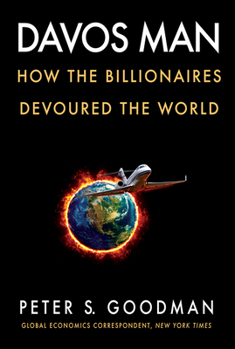Davos Man: How the Billionaires Devoured the World
Select Format
Select Condition 
Book Overview
A San Francisco Chronicle Bestseller
The New York Times's Global Economics Correspondent masterfully reveals how billionaires' systematic plunder of the world--brazenly accelerated during the pandemic--has transformed 21st-century life and dangerously destabilized democracy.
"Davos Man will be read a hundred years from now as a warning." --Evan Osnos
"Excellent. A powerful, fiery book, and it could well be an essential one." --NPR.org
The history of the last half century in America, Europe, and other major economies is in large part the story of wealth flowing upward. The most affluent people emerged from capitalism's triumph in the Cold War to loot the peace, depriving governments of the resources needed to serve their people, and leaving them tragically unprepared for the worst pandemic in a century.
Drawing on decades of experience covering the global economy, award-winning journalist Peter S. Goodman profiles five representative "Davos Men"--members of the billionaire class--chronicling how their shocking exploitation of the global pandemic has hastened a fifty-year trend of wealth centralization. Alongside this reporting, Goodman delivers textured portraits of those caught in Davos Man's wake, including a former steelworker in the American Midwest, a Bangladeshi migrant in Qatar, a Seattle doctor on the front lines of the fight against COVID, blue-collar workers in the tenements of Buenos Aires, an African immigrant in Sweden, a textile manufacturer in Italy, an Amazon warehouse employee in New York City, and more.
Goodman's revelatory expos? of the global billionaire class reveals their hidden impact on nearly every aspect of modern society: widening wealth inequality, the rise of anti-democratic nationalism, the shrinking opportunity to earn a livable wage, the vulnerabilities of our health-care systems, access to affordable housing, unequal taxation, and even the quality of the shirt on your back. Meticulously reported yet compulsively readable, Davos Man is an essential read for anyone concerned about economic justice, the capacity of societies to grapple with their greatest challenges, and the sanctity of representative government.





